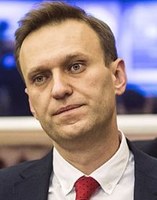(BRUSSELS) – Russia is drifting towards an authoritarian state and away from Europe, EU foreign affairs ministers said Monday, agreeing sanctions in response to the detention of opposition leader Alexei Navalny.
“In response to the events around the situation of Mr. Navalny we reached a political agreement to impose restrictive measures against those responsible for his arrest, sentencing and persecution,” said the EU’s foreign affairs chief Josep Borrell: “For the first time ever we will make use of the EU Global Human Rights Regime to this end.”
Ministers restated their unity of intent on relations with Rusia and discussed how these could develop within the framework of the five guiding principles and focused on: pushing back on infringements of international law and human rights, containing disinformation and cyberattacks, but also engaging on issues of interest to the EU.
In view of the latest developments, ministers agreed to proceed with work on future restrictive measures in response to serious violations of human rights.
Ministers also agreed to increase support to all those engaged in the country in defending the political and civil freedoms.
At the Council, ministers also exchanged views, via video conference, with the new US Secretary of State Antony Blinken on the substantive agenda for EU-US cooperation on key global, foreign and security policy issues.
This was first high-level interaction between the EU and the new US administration, a month from its taking office. The discussion showed the parties’ intention not only to deepen the EU-US partnership, but also their intention to form a joint global leadership in fighting the pandemic and dealing with recovery, mitigating climate change and ensuring the promotion of democratic values.
The discussion touched on international opportunities and challenges such as relations with China and Russia, Iran and security and defence. On Hong Kong, The Council was informed about the deteriorating situation and agreed on a set of short and longer-term actions, in addition to the initial response package adopted last July.
After a briefing by Mr Borrell on Myanmar and the EU’s response to the Military coup of 1st February, ministers reached a political agreement to apply sanctions, targeting the military responsible for the coup and their economic interests. It was also decided that all direct financial support from EU development assistance to the country’s government’s reform programmes would be withheld. At the same time, it was agreed that the EU would continue to support civil society, and provide basic services to the people of Myanmar.


